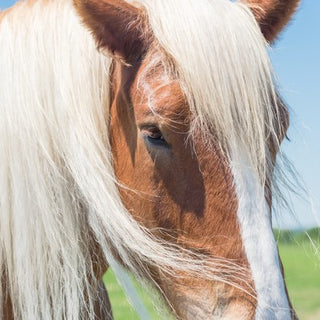Feeding the Belgian Draft Horse: A Complete Guide to Feeding this Breed of Gentle Giants
As the owners of the magnificent Belgian Draft Horse breed know, these gentle giants require a well-balanced diet to maintain their energy requirements and overall health. Belgian drafts, like other horse breeds, have unique dietary needs that horse owners must be aware of to ensure their long-term vitality. As part of a comprehensive feeding program, draft horse nutrition involves the consideration of multiple elements, including the type and amount of feed and any breed-specific health conditions.
Overview on How to Feed a Draft Horse & Draft Horse Nutrition
Draft horses are large ponies and even in moderate work do not require large amounts (if any) grain. The vast majority of drafts are exceptionally good doers, with good body condition scores on a forage only diet. Although every horse is an individual, most drafts do well on a basic diet of high amounts of lower quality grass hay and a mineral balance pellet. They are such easy keepers that we typically recommend feeding draft horses- and the Belgian horse breed in particular- no grain and poor quality hay. It's important to note these horses require large amounts of fiber for their huge GI tracts, but be careful to feed a hay too high in quality as they are prone to metabolic disorders.
Importance of Forage in a Draft Horse Diet
The cornerstone of feeding Belgian draft horses, as with most horse breeds, is high-quality forage. With digestive systems designed to process a consistent supply of fibrous foods, draft horses need a daily intake of forage, which includes pasture grass and hay. While draft horses generally require less energy-dense feed per pound of body weight compared to light horses, their larger size means their total daily feed intake is often more. Remember, every horse is different and the recommended feeding rate should be adjusted based on the draft horse’s weight and condition.
How Much to Feed Belgian Horses
The question of 'how much to feed a Belgian draft horse' is a common one among new horse owners. On average, a horse should consume about 1.5 to 2.5% of its body weight in forage daily. As Belgian horses are large, heavy horses, typically weighing between 1,800 and 2,200 pounds, they require significant amounts of feed. Depending on the horse’s activity level, mature draft horses may need between 27 and 55 pounds of feed daily, primarily forage. However, if your Belgian gelding is performing light work or your Belgian mare is pregnant, their feeding rates will need adjustments. As always, a first horse ownership rule is to consult with a professional in equine nutrition to tailor a feeding program that suits the individual horse's needs.
Equine Polysaccharide Storage Myopathy (PSSM) and the Belgian Draft Horse
A critical aspect of feeding Belgian draft horses is the awareness of breed-specific health conditions, particularly Equine Polysaccharide Storage Myopathy (PSSM). This muscle disorder is quite common in Belgian drafts and several other draft breeds combined. PSSM is linked to a horse's diet, particularly the intake of starches and sugars. Horses with PSSM have difficulty processing these compounds, which can lead to muscle stiffness, weakness, and in some cases, laminitis. Dietary adjustments such as reducing starch and sugar intake and increasing fat and fiber can help manage this condition in horses diagnosed with PSSM.
Importance of Hoof Quality and Nutrition
Essential nutrients like biotin, methionine, lysine, zinc, and copper contribute to healthy hoof growth. For horses rescued from adverse conditions, the right diet can make a significant difference in restoring hoof quality. Rescue horses, in particular, might require a specialized diet and veterinary care to ensure they regain their health. Regular checks on your draft horse’s hooves are an integral part of horse ownership, as good hoof health is a sign of overall wellbeing.
Feeding Recommendations for Belgian Horses with Different Activity Levels
Belgian draft horses used for different levels of work have varying dietary needs. Horses pulling heavy loads or plowing fields need more calories in their diet to maintain their weight compared to retired or lightly worked Belgians. These additional calories can come from increasing the amount of high-quality hay or adding more calorie-dense feeds such as beet pulp or soaked alfalfa. For Belgians at risk for PSSM or those who are overweight, lower-starch feeds and forages are essential. Even horses that are "easy keepers" and maintain or gain weight easily need their diets monitored to prevent obesity and associated health issues.
Conclusion: Feeding the Modern Belgian Breed
Feeding Belgian draft horses, one of the most popular draft breeds in the horse world, requires understanding the unique nutritional needs of these gentle giants. From a balanced diet and considering the risk of PSSM to understanding the importance of hoof quality and adjusting feeding recommendations based on work levels - all are critical for the health of these horses. The average Belgian draft horse needs forage to make up the largest portion of their diet and these horses may benefit from a vitamin and mineral balancer pellet to ensure they are meeting their nutritional needs.


Jeanette Montalbano
What’s a good saddle for a Belgian horse and what size gullet?